-
 10 min. read
10 min. read
-
 Trevin Shirey
Trevin Shirey VP of Marketing
VP of Marketing
- Trevin serves as the VP of Marketing at WebFX. He has worked on over 450 marketing campaigns and has been building websites for over 25 years. His work has been featured by Search Engine Land, USA Today, Fast Company and Inc.
Reputation is everything. Whether you’re a small business or a global enterprise, your reputation plays a major role in your company’s success. This is especially true as consumers become more tech-savvy than ever before.
As a result, your company’s online reputation is crucial to its long-term success — especially online. But just how important is reputation management to your business?
Why your company’s online reputation matters
1. Reputation management at a glance
Before we get into specifics, let’s look at reputation management from a birds-eye view. 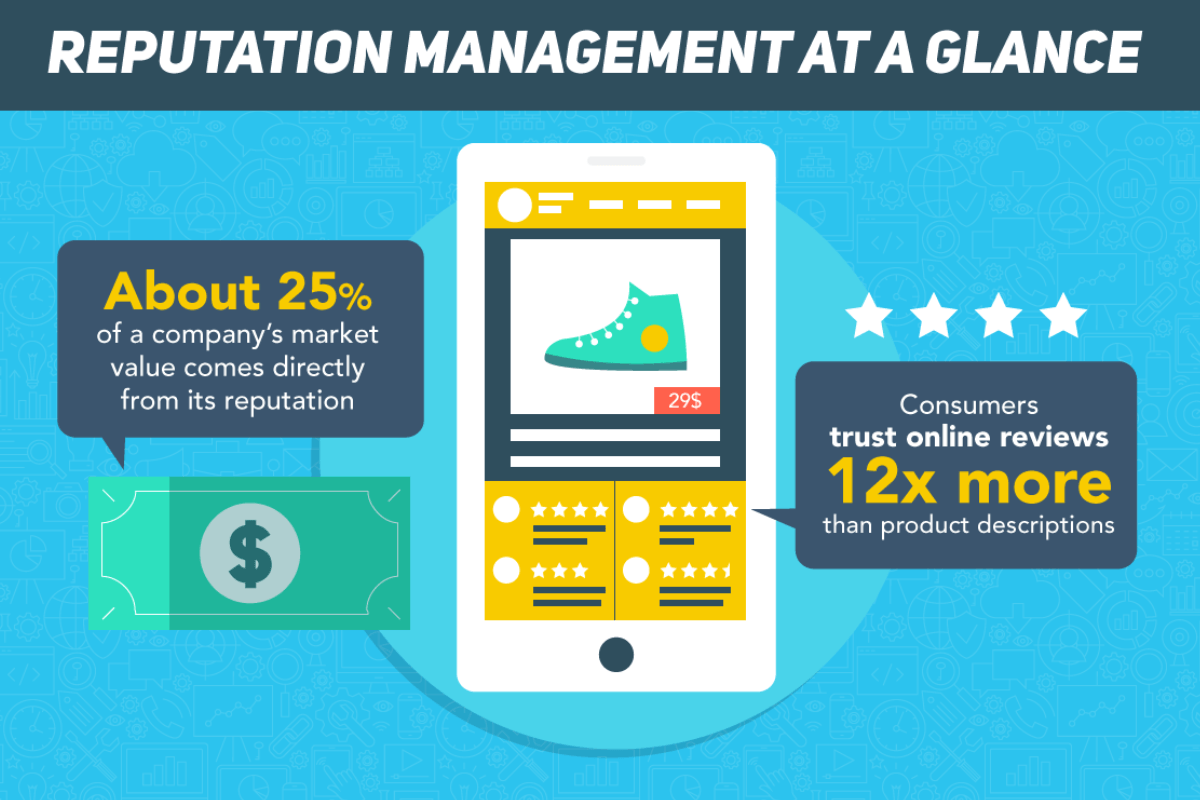 First, roughly 25% of a company’s market value comes directly from its reputation. So if you have a lot of critics, dissatisfied customers, or online attackers, you risk losing 25% of your company’s value — even if what they say isn’t true.
First, roughly 25% of a company’s market value comes directly from its reputation. So if you have a lot of critics, dissatisfied customers, or online attackers, you risk losing 25% of your company’s value — even if what they say isn’t true.
Beyond that, it’s also important to note that consumers trust online reviews 12x more than product descriptions.
For retail and ecommerce, that’s a huge advantage. That means you can add reviews directly to product pages and use them as marketing materials instead of just company feedback. Clearly, your reputation goes a long way in terms of sales.
But that leads us to one big question. If online reputation is so important, why doesn’t everyone want to improve it?
Find Top Reputation Management Companies Here!
2. Executives and reputation management
The fact is that every business wants a good reputation. But because the results may feel abstract, not everyone follows through. This is especially true for executives.
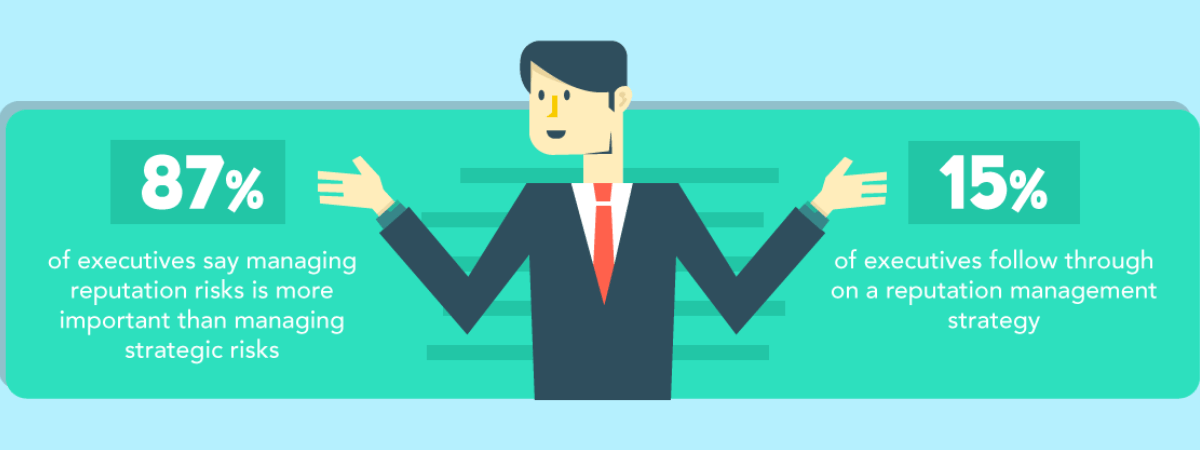 A whopping 87% of executives say managing company reputation is more important than managing strategic risk. That means 7/8 C-level businesspeople believe firmly in managing their company’s reputation. But for some reason, only 15% of executives follow through on reputation management strategies!
A whopping 87% of executives say managing company reputation is more important than managing strategic risk. That means 7/8 C-level businesspeople believe firmly in managing their company’s reputation. But for some reason, only 15% of executives follow through on reputation management strategies!
This could come from any number of reasons, including that some executives simply don’t believe in the power of the Internet.
No matter what the reason, 85% of executives are missing out on opportunities to improve their companies.
That’s almost just as many who say their business’s reputation is important. So what’s the bottom line? If you want to improve your company’s reputation, you have to make it a priority.
You can start by earning positive reviews with star ratings.
3. The importance of star ratings
Star ratings are today’s dominant method of showing online reviews. Google, Yelp, Facebook, and just about every other review outlet shows reviews with stars. Most of the time, a “five star” rating is the best possible rank you can achieve.
5/5 stars means you’ve satisfied 100% of your customers with a product or service. But you don’t need 100% satisfaction to get new sales. 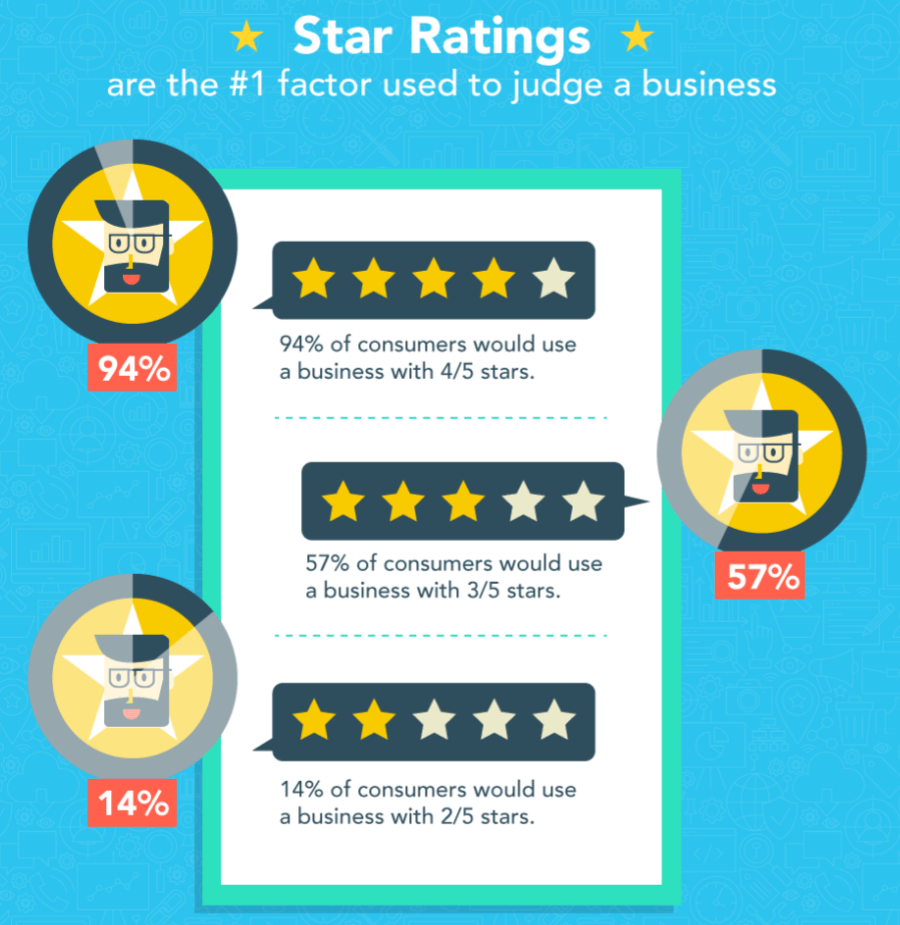 94% of consumers say they’d buy from a business with 4/5 stars, 57% of consumers would buy from a business with 3/5 stars, and 14% of consumers would buy from a business with 2/5 stars.
94% of consumers say they’d buy from a business with 4/5 stars, 57% of consumers would buy from a business with 3/5 stars, and 14% of consumers would buy from a business with 2/5 stars.
If your company has 1/5 stars, you can bet that practically no one will buy from you online.
This means it’s in your best interest to start building positive reviews online. But where do you start?
4. The popularity of review sites
There are tons of online outlets for product and business reviews. It doesn’t always pay to focus on all of them, especially if you’re a small business. That’s why we recommend choosing three and working on them first.
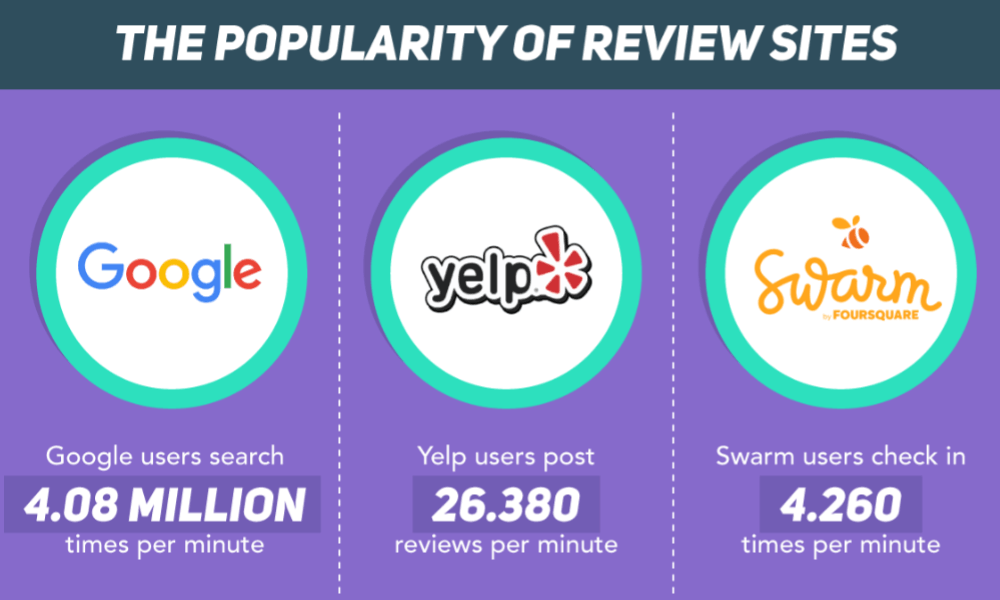 Google fields 4.08 million queries per second. That means you can be pretty sure that someone’s looking up your business at least once a week, if not once per day! On top of that, Yelp users post 26.38 reviews per minute.
Google fields 4.08 million queries per second. That means you can be pretty sure that someone’s looking up your business at least once a week, if not once per day! On top of that, Yelp users post 26.38 reviews per minute.
This is so many reviews that you almost certainly have a rating on Yelp, even if you didn’t create your business’s listing!
Last, Swarm users check in 4.26 times per minute.
This is more sensitive to brick and mortar businesses with storefronts, but it still carries a lot of weight. Your business is probably on all of these sites, regardless of whether you signed up for the services. But if you didn’t sign up for them, why should you care what these sites say?
The short answer — sales.
5. How your reputation impacts sales
Your online reputation has a major impact on your company’s sales. 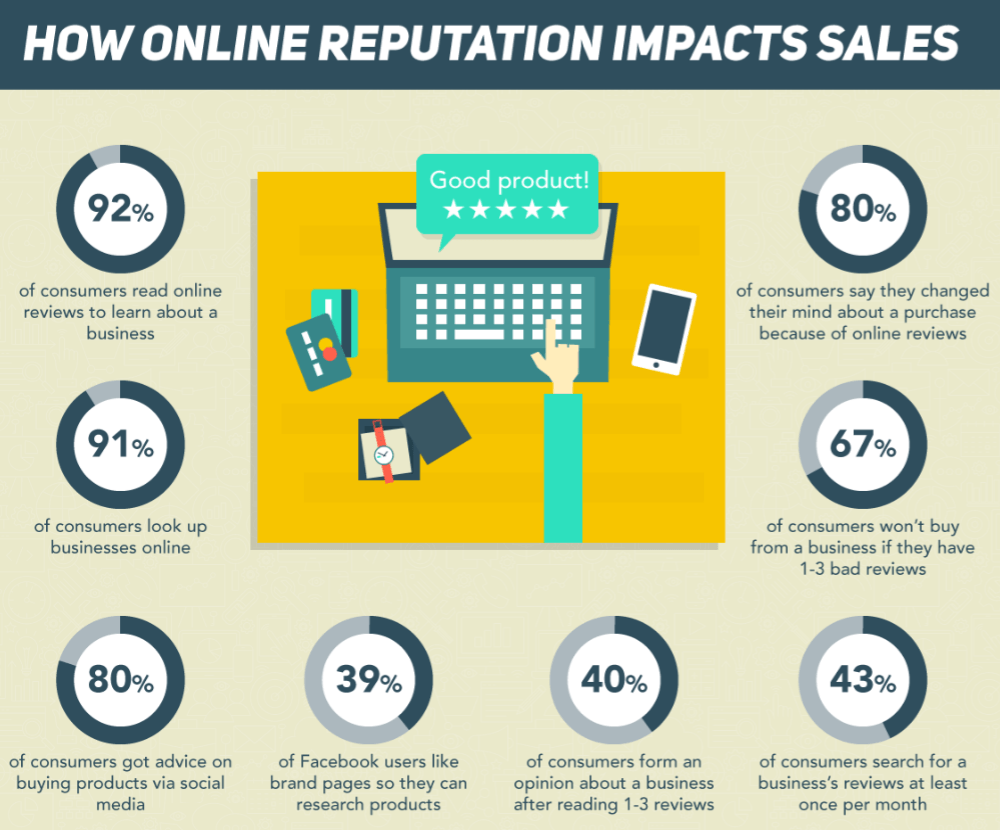 First, 92% of consumers read online reviews to learn about a business. So if you have bad reviews online, you could be losing an overwhelming majority of your customer base!
First, 92% of consumers read online reviews to learn about a business. So if you have bad reviews online, you could be losing an overwhelming majority of your customer base!
On top of that, 91% of consumers look up businesses online.
That means 9/10 potential customers will find you online, even if you haven’t actively monitored your online reputation! But it doesn’t just stop with online review sites. 80% of consumers get advice on products from social media.
So if you’re not on Facebook, Twitter, LinkedIn, or other social platforms, you need to start today. 80% of consumers say they’ve changed their mind about buying because of online reviews, too. It’s not specified whether those changes are good or bad — but it is clear that reviews impact your customers’ decisions.
Next, 67% of consumers won’t buy from a business if they have 1-3 bad reviews.
So even one negative review could completely change how many sales you get at any given time. 43% of consumers look up a business’s reviews at least once per month, as well. That means your reputation doesn’t just matter to active customers — it’s also important to subscribers, repeat customers, and future prospects.
In addition, 40% of consumers form an opinion about a business after reading 1-3 reviews.
That’s also the number of reviews a lot of websites show as a sample. So even if you have 100 good reviews and three bad ones, you could still lose 40% of your customers if the bad reviews show up above the good ones. This is also a strong case for continuing a reputation management strategy after you’ve achieved the initial results you want.
Recent reviews will empower your company to sell more over time.
Last, 39% of Facebook users like brand pages so they can research products. So if you have a Facebook page, you can be sure your followers will look to that page to determine if they want to buy from you. This last data point is especially important for ecommerce.
You can have a lot of product and business reviews right on your Facebook page. And if you have those, you can feed them straight to a product’s sales page on your site. Why?
 When a product has 50 or more reviews, your sales increase by 4.6% for that product. That may not sound like a huge leap at first — but expand it to your entire product catalog.
When a product has 50 or more reviews, your sales increase by 4.6% for that product. That may not sound like a huge leap at first — but expand it to your entire product catalog.
If you could increase every single product’s sales by 4.6%, you just made a huge leap in company profits. Even if you only have 10 items for sale, this is still huge.
But wait a second — the Internet is still a pretty new technology, regardless of how powerful it is. Some companies may think they can just hire better sales people and that’ll offset the bad reviews they have online. This is why they’re wrong.
7. Reputation management and hiring
Your company’s online reputation doesn’t just impact sales. It also affects who you hire. 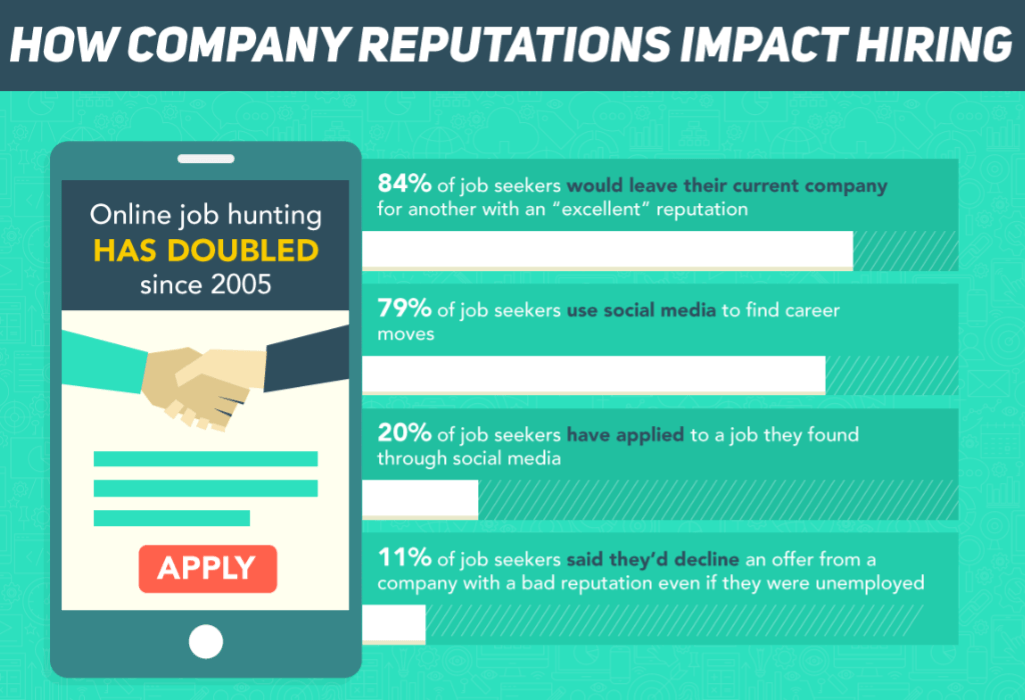 First, online job hunting has doubled since 2005.
First, online job hunting has doubled since 2005.
In just 12 years, the Internet has become the prime way people find new steps in their career path. It’s gotten to the point where some review sites exist exclusively to help job hunters learn more about corporate reputations (like Glassdoor).
84% of job hunters would leave their current company for another one with an “excellent” reputation. So if your business doesn’t have a great reputation right now, you’re risking your whole staff with a bad public image.
On top of that, 79% of job seekers use social media to find their next career move.
That means you have to maintain a positive image on social media if you want to attract the best, savviest talent for your business. Interestingly, 20% of job seekers have applied to a job they found via social media.
That may not sound like much at first, but that means you could get five applications for every job instead of four. Those results compound, too.
That 20% gives you 10 new applicants instead of eight and so on. In other words, your reputation gives you choices when it comes to improving your business.
Most important, 11% of job seekers would decline an offer from a company with a bad reputation — even if they were unemployed! This may sound dramatic, but it speaks to the incredible power of a company’s reputation.
If you don’t maintain it, you risk losing 1/10 applicants to your company! So the verdict is clear — your company’s reputation is essential to its long-term success. But how do you improve it?
8. How to improve your company’s reputation
We saved the best for last. If you want the benefits of a great online reputation, this is how you start. 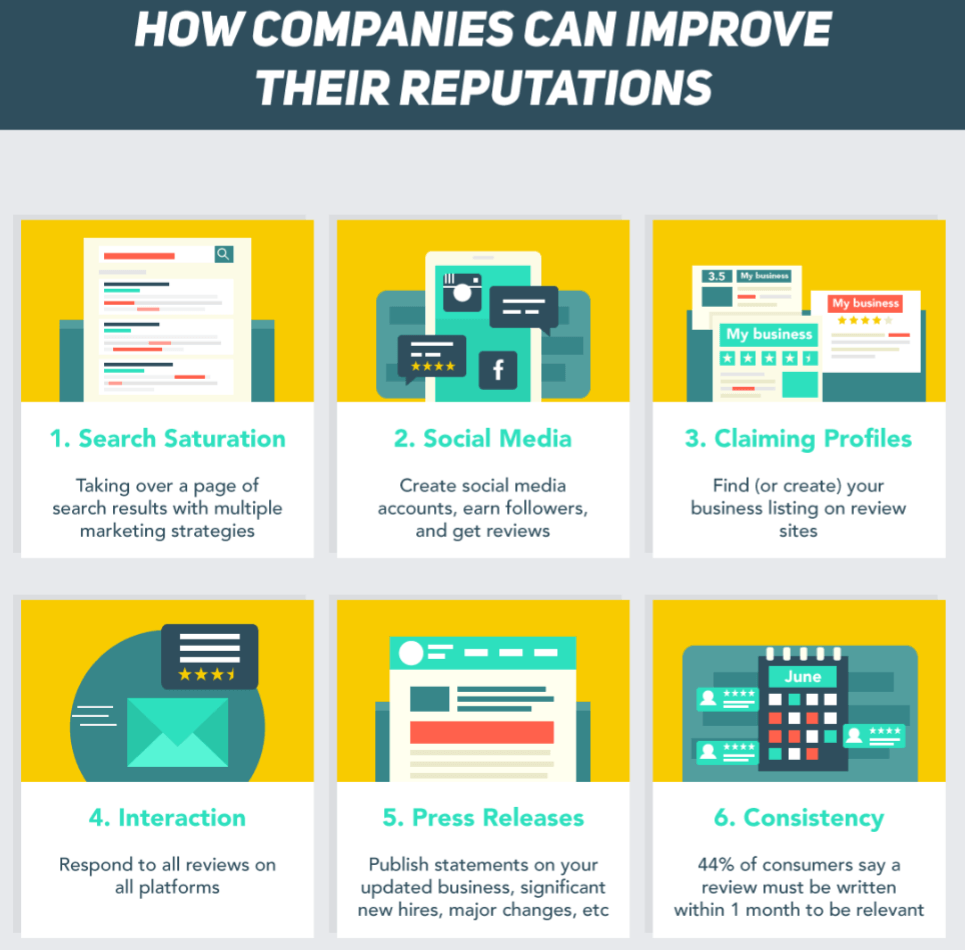 Search saturation is a great first step.
Search saturation is a great first step.
This is the process of creating content around keywords that show negative news about your business in search results. Search saturation lets you “reply” to this negativity and even push negative news off of the first page of SERPs. At the end of the day, that makes sure you’re putting your best foot forward for new customers or job applicants.
Next, social media plays a huge role in how the public perceives you. Creating profiles on major social networks and developing a following helps you out in SERPs as well, and it also gives you a consistent audience online.
Claiming profiles on review sites is important as well. As we suggested earlier, you can start with Google, Yelp, and Swarm, among others.
Interaction is also important for a positive reputation.
Interaction means you reply to people who leave positive or negative reviews, following up with them in the way that’s most appropriate.
Press releases can help as well. Lots of press release sites have SEO power, which helps with search saturation. You can also use press releases to appeal to journalists, bloggers, and publications in your industry.
Last, we have consistency. 44% of consumers say reviews must be written within one month to be relevant. So once you start your reputation management strategy, keep going!
Want more on reputation management?
Want to learn more about how you can improve your online reputation?
Contact WebFX today and we’ll help you set up a reputation management strategy!
-
 Trevin serves as the VP of Marketing at WebFX. He has worked on over 450 marketing campaigns and has been building websites for over 25 years. His work has been featured by Search Engine Land, USA Today, Fast Company and Inc.
Trevin serves as the VP of Marketing at WebFX. He has worked on over 450 marketing campaigns and has been building websites for over 25 years. His work has been featured by Search Engine Land, USA Today, Fast Company and Inc. -

WebFX is a full-service marketing agency with 1,100+ client reviews and a 4.9-star rating on Clutch! Find out how our expert team and revenue-accelerating tech can drive results for you! Learn more
Try our free Marketing Calculator
Craft a tailored online marketing strategy! Utilize our free Internet marketing calculator for a custom plan based on your location, reach, timeframe, and budget.
Plan Your Marketing Budget
Table of Contents
- Why Your Company’s Online Reputation Matters
- 1. Reputation Management at a Glance
- 2. Executives and Reputation Management
- 3. the Importance of Star Ratings
- 4. the Popularity of Review Sites
- 5. How Your Reputation Impacts Sales
- 7. Reputation Management and Hiring
- 8. How to Improve Your Company’s Reputation
- Want More on Reputation Management?

Maximize Your Marketing ROI
Claim your free eBook packed with proven strategies to boost your marketing efforts.
Get the GuideTry our free Marketing Calculator
Craft a tailored online marketing strategy! Utilize our free Internet marketing calculator for a custom plan based on your location, reach, timeframe, and budget.
Plan Your Marketing Budget






